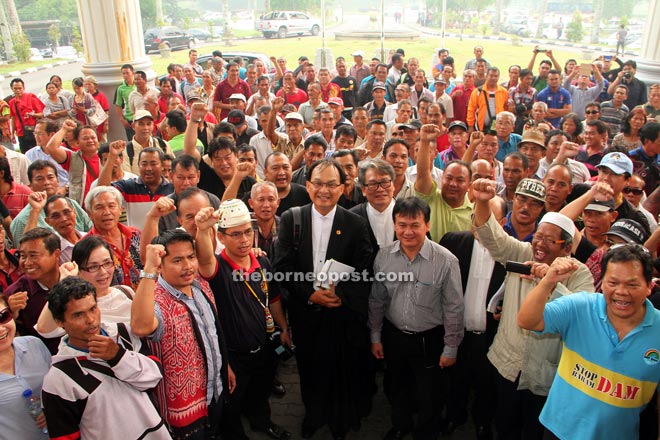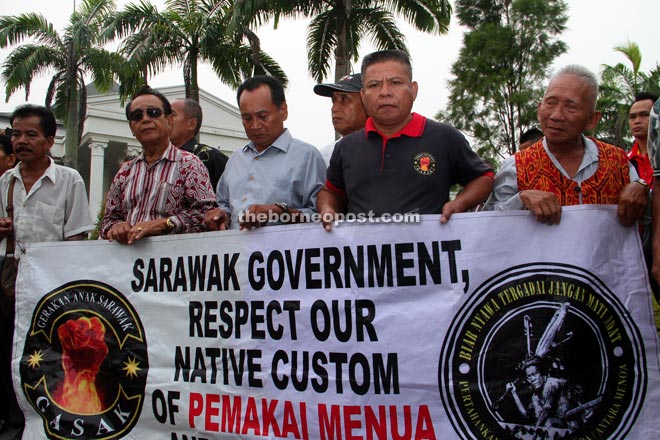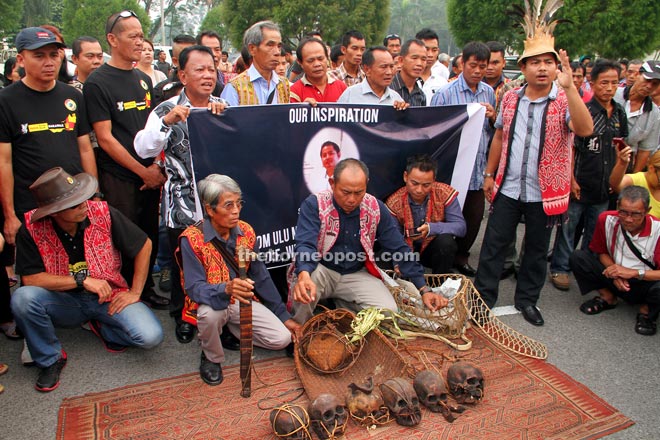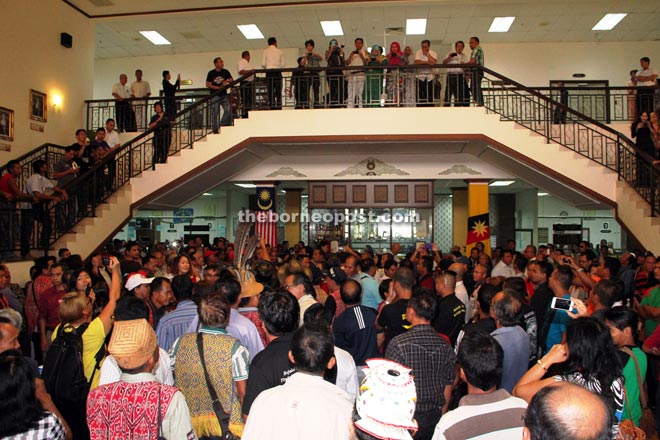Iban NCR landowners perform ritual seeking divine help in Federal Court hearing on their rights over their hunting and gathering grounds

Baru (front, centre) and Krian assemblyman Ali Biju with the native landowners and supporters who were present at the Kuching Courthouse to show their support yesterday. — Photo by Chimon Upon
KUCHING: Native landowners performed the ‘sandau ari’ miring, an Iban ritual rarely performed these days to invoke the spirits to help them before they go to war, at the car park of the Courthouse here yesterday.
However, they were not going to war with spears and machetes during the Federal Court sitting yesterday afternoon. They were fighting against an appeal by the state government against the Court of Appeal’s decision on June 21, 2013, that recognised ‘pemakai menoa’ and ‘pulau galau’ as native customary rights (NCR) land.
The NCR land owners were supported by hundreds of natives, who went to the Courthouse by buses and own transport.
The jury is still out on the effectiveness of the ‘sandau ari’, which required the `manang’ (high priest) to place seven human skulls and other paraphernalia at the car park when performing the ritual, as the Federal Court reserved its decision on the appeal.
Court of Appeal president Tan Sri Md Raus Sharif, who chaired the hearing, said the decision would be delivered on a date to be fixed later.
Md Raus made this ruling after hearing submissions by state legal advisor Datuk JC Fong, representing the applicant, and from Baru Bian and Dr Yogeswaran Subramaniam, representing respondents Tuai Rumah Sandah Sabau of Rumah Sandah in Ulu Machan, Kanowit, and eight other NCR landowners.
Other judges who sat with Mid Raus were Tan Sri Abdull Hamid Embong, Tan Sri Ahmad Maarop, Tan Sri Zainun Ali and Tan Sri Abu Samah Nordin.
Baru said the stake of the hearing was high as the decision, whichever way it goes, would affect more than 100 similar cases pending in Sarawak and future NCR land cases in the country.
“If we can win ‘pemakai menoa’ and ‘pulau galau’ as a method of creating NCR, then that would be a bigger area. They (applicant) are trying to limit us to ‘temuda’.
“If we lose this case, that means we cannot have NCR beyond ‘temuda’ as ‘pemakai menoa’ and ‘pulau galau’ will no more be NCR,” said Baru.

Some of the natives present at the Kuching Courthouse holding their banners before the proceeding yesterday.

A ‘marang’ peforming a rare special miring called ‘sandau ari’ before the start of the Federal Court proceeding.

The Kuching Courthouse was packed with native landowners, who were present to show their support — Photos by Chimon Upon
The gist of the argument in this case is whether the native customs have the force of law to create native customary lands.
The federal court also heard arguments on whether it is necessary for these pre-existing native customs to be expressly given the force of law by the legislative or executive arms of the state government, before such customs are given legal recognition.
Fong, in his submission, among others, stressed on the need for continuous occupation to entitle the land to be recognised as NCR, adding NCR could not be established simply by the natives entering the jungle to collect products without clearing the land.
He also argued that `pemakai menoa’ and `pulau galau’ had no force of law as it was not codified in the Iban customs or any legislation in the state.
Baru, in his response, raised Section 5(2) of the state Land Code. He argued that the customs should be codified and given effect by the law of Sarawak as the term ‘any lawful methods’ in the point of law, to him, incorporated any uncodified customs.
Fong questioned whether ‘pemakai menoa’ and ‘pulau galau’ existed before the First Sarawak White Rajah Sir James Brooke arrived in Sarawak, and Baru responded they existed well before his (Brooke) arrival.
Fong asserted that the state government’s decision to appeal the case was not an attempt to deny the rights of the natives, but merely wanted to know the nature of the land.
He noted the decision of the Federal Court would not only be important to the native themselves. It would also be important to land administration in Sarawak and every person that had been issued with forest licences and land titles.
Baru, in his submission, said the Court of Appeal in Nor Nyawai’s case recognised ‘pemakai menoa’ and ‘pulau galau’ as NCR, which was confirmed by the Madeli Salleh’s case in the Federal Court.
“Although I believe that it (pemakai menoa and pulau galau as NCR) has been decided in Madeli Salleh case through Nor Nyawai’s case, the problem is they (applicant) are trying to say that was never decided.”
He refuted Fong’s claim that his firm had won only two full trial cases in the Court of Appeal,namely Nor Nyawai and Tuai Rumah Sandah’s cases. He said his firm had actually won 10 full trial cases on ‘pemakai menoa’ and ‘pulau galau’ in the Court of Appeal.
The situation was tense during the recess when Fong was heckled by the native landowners and their supporters. He had to be escorted by security personnel.
